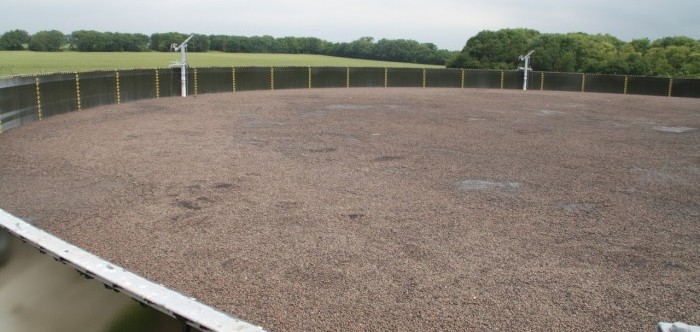Grant funding is available to pig producers for slurry stores and lagoons under the Countryside Stewardship Programme (CSS) capital grant options.
The options are included in the 2020 scheme to help improve water quality measures.
NPA senior policy adviser Ed Barker said there were a number of options of particular interest, including self-supporting covers for slurry stores, roofing for manure storage areas, concrete yard renewal and floating covers for slurry stores and lagoons, offering differing payment rates per square metre.
“You can apply for these options on their own, but you can also apply for other water quality options, as well as the more traditional land management options under Countryside Stewardship – in one big package,” Mr Barker said.
“The benefit of CSS is that you don’t have to meet arbitrary points targets or anything like that – you simply apply for as much or as little as you like. All of the other options can be found here.”
Are you eligible?
Not every pig business may be eligible for the cover grants. Defra is targeting funding only to areas that they deem to be at ‘high risk’ of water pollution – areas that are ‘medium’ risk generally are not covered.
In order to find out if you are in a high risk area, simply follow the steps outlined here.
“You need to consult the Defra maps and check if your farm falls under a ‘red’ area – if so, then you are likely to be eligible,” Mr Barker said.
“If you are near a border of high and medium risk, then it is still worth checking eligibility via Catchment Sensitive Farming (CSF) officers. Even if you are in a medium risk area it is still worth checking with a CSF officer.
“Once you have checked if you in a high priority zone, then your next step is to make contact with your local CSF officer. This is not necessary to the process, but is certainly advised as a CSF endorsement on an application will make the chances of getting a grant much higher.”
The list of CSF officers, by catchment, can be found here.
Mr Barker added: “If you are a contractor, keeping pigs under a B&B or contract rearing agreement, the advice from the RPA is that businesses rearing pigs under contract would be eligible to apply, providing the applicant has an existing farming business as their primary source of income.”
How to apply, if you are eligible
Applications for grant funding close on July 31, 2020. After this point, Natural England will assess your application and if they are happy with it, they will offer a scheme starting from January 1, 2021. You can also use this time to allow for any permissions or consents you may need.
For the two slurry and lagoon grants shown above you must get consents from:
- The Environment Agency, to check what is required as new and significantly altered stores may have to meet the silage, slurry and agricultural fuel oil (SSAFO) regulations 2010
- The local planning authority, to check whether planning permission is required to carry out the planned works.
You do not need to provide this with your application, but you will need to submit consents/permissions with your payment claim (which would be May 2021).
The guidebook to the grant schemes can be found here with information on how to apply online or by post.
Last opportunity?
“The future for water quality options and countryside stewardship is very unclear. This is partly as a result of the Government’s wider approach to payments outside of the CAP, but also because of regulations regarding mandatory covering of slurry stores in 2021,” Mr Barker added.
“These may mean that the options will be unavailable from 2021 as grant funding cannot be provided for meeting minimum legislation. Therefore, if you are interested, you are seriously advised to look at taking up these options this year.’




